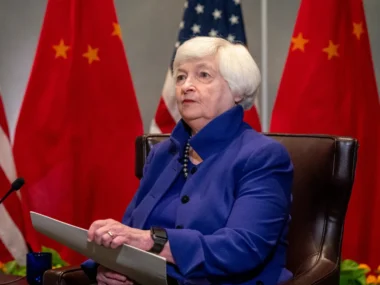An economic decline is typically expected to increase spending on small luxuries like movies. However, China, the world’s second-largest economy, is proving this theory wrong as it faces a prolonged slump.
In 2024, China’s box office revenue fell by 23% compared to the previous year, totaling 42.5 billion yuan ($5.8 billion), as reported by China Film News. This figure is 34% lower than the record-setting 2019, before the pandemic and economic issues took a toll on the industry.
The top-performing film was “Yolo,” a feminist comedy directed and starring Jia Ling. The movie, which tells the story of a woman in her 30s who transforms her life by losing weight and learning boxing, grossed 3.5 billion yuan ($474 million). Jia lost 100 pounds during filming. According to Maoyan, comedy remains the most popular genre, contributing to 36% of the total box office revenue, as stated by Liu Zhenfei, a data analyst at Lighthouse Research Institute.

Audiences are getting ready to see the film “YOLO” at a cinema in Shanghai, China, on February 14, 2024.
The overall box office performance was weak, with the annual decline partly due to fewer films being produced. Official data shows that only 612 films were made in 2024, down from 792 the previous year.
This drop in film production isn’t limited to China. ProdPro, which monitors production trends, reported a 17% global decrease in active filming projects from July to September 2024 compared to the same period in 2022, largely due to the ongoing effects of Hollywood’s 2023 strikes.
This trend likely contributed to a 3% drop in the U.S. box office in 2024, which totaled $8.72 billion, according to Deadline’s calculations. The downturn in China’s movie industry came as a surprise to many, as movie theaters had performed well in 2023, providing a rare positive note in an otherwise sluggish economy following a brief recovery after China eased strict COVID-19 restrictions.
On Christmas Eve, which is not a public holiday in China, box office revenues hit their lowest level in over 13 years. Reuters reported that the total was just 38 million yuan ($5.2 million), a fraction of last year’s revenue and the lowest since Maoyan started tracking data in 2011.
Declining consumer spending.
Historically, cinemas have performed well during challenging economic periods, as they provide an affordable form of escapism, a trend linked to the “lipstick effect,” where consumers splurge on small indulgences during uncertain times.
Although economic sentiment has improved since Xi Jinping’s stimulus package was introduced in September, consumer spending remains sluggish.

A cinema-goer passes by movie posters at a theater in Shanghai, China, on February 10, 2024.
Chinese household consumption slowed in 2024, largely due to the ongoing property downturn and weak consumer confidence. Analysts from Goldman Sachs noted that Tier-1 cities, including Beijing, Shanghai, Guangzhou, and Shenzhen, where the impact of falling property prices is more severe, performed worse than smaller cities.
In addition to weak spending, China is facing a property crisis, mounting debt, and high youth unemployment. While officials have yet to introduce significant stimulus measures aimed directly at consumers, they have rolled out “cash-for-clunkers” programs, which have driven up sales of cars and home appliances.
To address the struggling box office, the China Film Administration launched a subsidy initiative last month. As reported by Xinhua news agency, several banks and online booking platforms will collaborate to invest 600 million yuan ($82 million) in discounted tickets and lucky draw contests to encourage more people to visit cinemas in the upcoming year.











